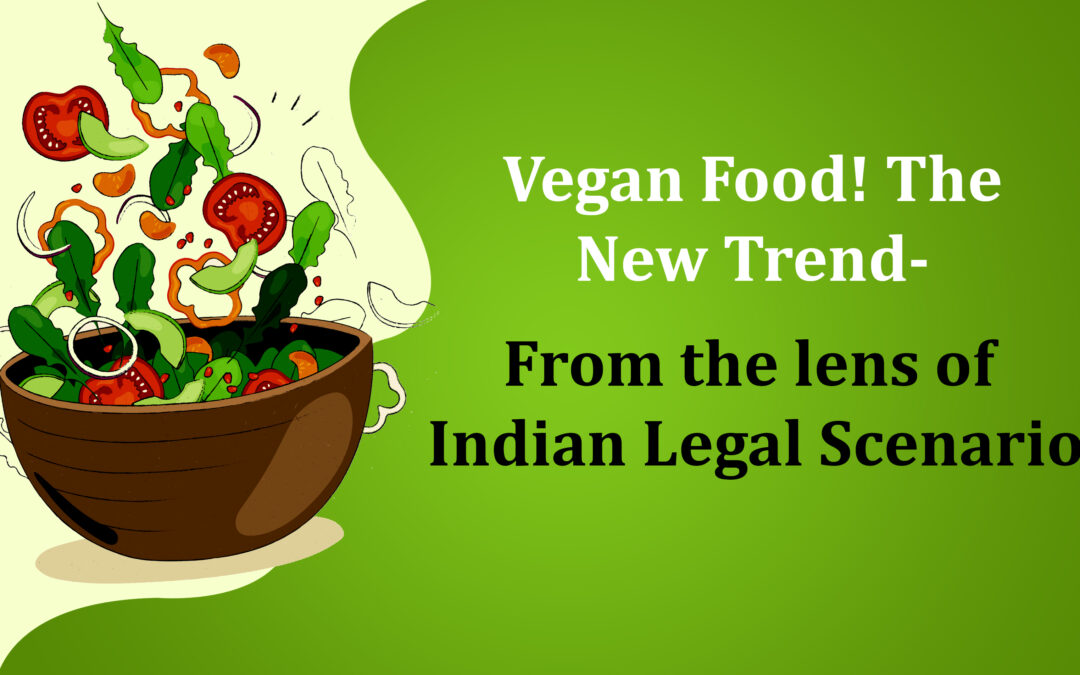“Ethical veganism is a philosophical belief protected under the Equality Act 2010” – Judge Robin Postle
Vegan Food is the new global trend and according to the report published by Allied Market Research, the market size of the Vegan Food was valued to be $19.7 billion in 2020 and is expected to reach up to $36.3 billion by 2030. In this blog, we will be covering the unique legislation on Vegan Food brought up by the Food Authority of India.
Global Scenario:
The Universal Declaration of Human Rights, 1948 states that the declaration applies to all human irrespective of their dietary and lifestyle choice. Moreover, in European Union, the law of labeling of vegan food specifically plant-based meat has been adopted by several European countries after a judgement from European Court of Justice which held that dairy terms like milk, yogurt, cream, cannot be used for marketing a plant-based product. In United States of America, states like Mississippi, Louisiana, South Dakota, Missouri have legislations in place to prohibit the use of term “sausage”, “hot dogs” or any other meat terms to describe plant based food product. The concept of vegan food have been recognized in many parts of the world. For instance: Portugal mandates keeping of at least one plant-based item in the menu of public canteens, and French Schools serve vegetarian meal at least once a week.
Indian Scenario:
Though the concept of Vegan food is new to India, the Food Safety and Standards Authority of India (FSSAI) is all set to regulate the Food Business Operators (FBOs) of Vegan Food. The FSSAI, has issued the Food Safety and Standards, (Vegan Foods) Regulations, 2022 effective 10th June, 2022 for regulating all the persons involved in vegan food business, that is, people involved in manufacturing, selling, packing, offering for sale, marketing or distributing or importing the vegan foods.
Vegan Definition:
Vegan food includes those food items which does not involve / use any ingredients, additives and processing aids of animal origin. It excludes milk, milk products, fish, poultry, meat, egg, egg products, honey, honey bee products, material of insect origin like silk, dyes, chitin/ chitosan, etc. and ingredients that are clarified by using product sourced from animals. The foods made from plant, like nuts and seeds, legumes, soy milk, almond milk, vegetable oils, bread, rice are examples of vegan food.
Key Requirements for Compliance by FBOs:
-
Submit Application to the Authority for inspection and verification: All FBOs involved in the business of Vegan Food must submit an application related to plant / machinery / premise to the FSSAI. Once the application is submitted, the Food Safety Officer or Designated Officer shall conduct inspection and verification of such plant / machinery / premise. Analytical tools must be used before endorsement of vegan logo to the final product.
-
Comply with the Packaging and Labelling Requirements under Food Safety and Standards (Labelling and Display) Regulations, 2020: The FBOs dealing with manufacturing/ pack / sell/ offer for sale / market need to ensure that the vegan food is packaged and labelled as per the requirements mentioned under Food Safety and Standards (Labelling and Display) Regulations, 2020 except clause (b) of sub regulation (4) of regulation 5.
-
Store Vegan Food in Proper Manner: The seller of Vegan Food has the responsibility to store and display the vegan food in such a manner that it is distinguishable with the non-vegan food.
-
Every Vegan Food must carry a logo: A unique logo has to be displayed over the packet of vegan food. The logo should be depicted with a green leaf with a “V” indicating the food is vegan inside a green border box.
-
Comply with Good Manufacturing Practices: All FBOs need to ensure that the stages involved in production, processing and distribution of vegan food are designed by taking appropriate precautions and as per the Good Manufacturing Practices (GMPs) in order to avoid the presence of non-vegan substances. Hence, the FBOs need to ensure the conformity with GMPs while producing, packaging and preparing the vegan food.
- Establish a system in place to ensure traceability: A traceability has to be established up to Manufacturer level by the FBOs to keep intact the integrity of vegan food.
-
Prohibition to import without a Certificate: All vegan foods imported from India, has to be imported after receiving the certificate from the recognized authority of the exporting countries.
The movement of Veganism has been really gearing up and receiving a lot of traction. The Animal Rights Organization in India, PETA has been urging people to turn Vegan. Even the most favourite brand of India “AMUL” was recommended by PETA to produce plant-based milk product. Growing trend towards Veganism has led the food regulator to introduce the new regulation casting above responsibilities on the FBOs for the safe consumption of vegan food by the consumers.
Lexplosion Solutions have been helping organizations to comply with the new regulations in India as well as globally. Connect with us to know if these changes has any implications on your business and help us build an efficient compliance management system for your organization. Our flagship compliance management tool Komrisk can help you mitigate your overall compliance risk. To know more connect with us now!
Sources
- Mr J Casamitjana Costa v The League Against Cruel Sports: 3331129/2018
- https://www.globenewswire.com/en/news-release/2022/06/22/2467245/0/en/Global-Vegan-Food-Market-to-Reach-36-3-Billion-by-2030-Allied-Market-Research.html
- Verband Sozialer Wettbewerb eV v TofuTown.com GmbH, Case C-422/16
- https://www.npr.org/sections/thesalt/2019/07/23/744083270/what-gets-to-be-a-burger-states-restrict-labels-on-plant-based-meat
- https://meatfreemondays.com/portugal-puts-vegan-meals-public-menu/
- https://www.connexionfrance.com/article/French-news/French-schools-now-need-to-offer-vegetarian-menu-at-least-once-a-week-says-Assembly
- https://www.fssai.gov.in/upload/notifications/2022/06/62ac3f9dba33cGazette_Notification_Vegan_Food_17_06_2022.pdf
- https://www.udayavani.com/english-news/peta-india-pitches-go-vegan-message-puts-up-billboards-in-bluru
- https://economictimes.indiatimes.com/industry/cons-products/food/vegan-controversy-amul-gives-peta-a-taste-of-india/amul-hits-back/slideshow/83203369.cms
Written by: Amanya Gangawat
Co Authored by: Anchal Sharma, Saikat Mondal
Disclaimer
All material included in this blog is for informational purposes only and does not purport to be or constitute legal or other advice. This blog should not be used as a substitute for specific legal advice. Professional legal advice should be obtained before taking or refraining from an action as a result of the contents of this blog. We exclude any liability (including without limitation that for negligence or for any damages of any kind) for the content of this blog. The views and opinions expressed in this blog are those of the author/(s) alone and do not necessarily reflect the official position of Lexplosion Solutions. We make no representations, warranties or undertakings about any of the information, content or materials provided in this blog (including, without limitation, any as to quality, accuracy, completeness or reliability). All the contents of this blog, including the design, text, graphics, their selection and arrangement are the intellectual property of Lexplosion Solutions Private Limited and/or its licensors.
ALL RIGHTS RESERVED, and all moral rights are asserted and reserved.





